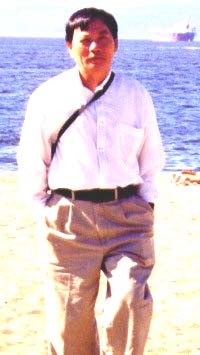 |
Le Monde Diplomatique December
2007 Writing
the future of a post-war nation By
Jean-Claude Pomonti Heroism has always been part of Former resistance fighters inside and
outside the Communist
Party worry about this. But this kind of vacuum can obscure the
emergence of a
more complex society; the official heroes and villains dichotomy has
weakened
over the years. Cam Thi adapted a quote from Marx to describe After the wars, a generation of
talented writers devoted
themselves to writing about the misery of battle and hard times after
victory.
Most were from the victorious north, and their leaders included Nguyen
Huy
Thiep, Bao Ninh, Duong Thu Huong and Pham Thi Hoai. Their view of the
war and
the resultant society dominated Vietnamese literature in the period of
the
Communist Party’s first reforms in 1986 and the opening of the country
to the
world. Some also wrote about the scars left by the brutal agrarian
reforms of
1955-56 in the north, or later repression. From the 1990s Censorship is often imposed after the
event; publishers have
to consider their responsibilities before taking on a book in case it
is
withdrawn from circulation, as happened to The Story of the Year 2000
published
by Thanh Nien (Youth). Its author, Bui Ngoc Tan, relates the harsh
conditions
under which he was detained 30 years ago during an anti-revisionist
campaign.
The authorities ordered his book to be destroyed just weeks after it
went on
sale. Yet in 2005 Chinatown, a novel by Thuan, a young French
Vietnamese
writer, was published in But this provides no clues for the
future. The authors from
the first reform period challenged the myth of official history and
socialist
realism with force and talent. But with the exception of the human
rights
activist Duong Thu Huong, they have less to say about the future. The
Communist
Party of Vietnam (CPV, “father of victory”) is attempting to revive its
legitimacy by economic expansion, the struggle against “negative
phenomena”
(corruption and moral degradation) and a return to national, or
historic,
values. Replacing a worn-out “internationalist solidarity” with
Confucius might
reassure a population that has been fed empty slogans for so long it
scarcely
notices them. But people do have aspirations, and
they are elsewhere.
Internet cafés abound all over the country. Young people, often at a
loose end,
are discovering a world without borders. They travel via the web in
search of
different values. Newspapers organise popular chats with writers,
including
some from Vietnamese communities abroad. Frontiers are disappearing and
the
young claim that the horizontal is gaining over the vertical: their
answers
come from over the horizon, not from the authorities on high. “The government wants to open doors to
young poets and
writers but imposes limits. It wants us to follow tradition and write
about war
heroes, but we can’t, we didn’t live through that. We want to talk
about sex,”
said Lynh Barcadi, the pen name of a young poet. She is a member of a
small
group in Ly Doi is spokesman for a group of
“anti-poets” called Open
Your Mouth (mo mieng) founded in 2000 in “I have feelings for vast spaces, not
for tradition. I have feelings for my own time, not for others. I have no principles or party,
religion or ideology, No organisation – damn it, I belong to
myself. I have feelings for primitive freedom
and for my true face. I want to declare war on all things
commercial: the museums
and critics, art historians, aestheticians and anything called
“cultural
forces”. I am convinced that true art is yet to
be born, for true
freedom and true justice have not been established. Freedom is not yet born, nor is the
masterpiece of liberty.” These young writers flirt with
nihilism. They may be coarse
but never vulgar. They use provocation well to make masks fall and let
in fresh
air. “Provocation in language is not so important. What is important is
to use
the real vernacular; the principal thing is honesty,” said Ly Doi. The
anti-poets do not attempt to publish their texts formally; their
“publisher”,
Giay Yun (waste paper), distributes photocopies and CDs. They are
over-age
students and proud dropouts who write in the rude spoken language of
the south.
Their works are the literature of bui doi (life dust), and they see
themselves
as the voice of the working-class suburbs in which they grew up,
although they
have solid cultural and historical knowledge. They are attempting to think and write
differently and are
influenced by a “citizen of the world”, Tran Quoc Chanh, (1) enfant
terrible of the CPV veterans realise that a party that
is both player and
referee is ambiguous and has no vision. It offers no alternative or
dialogue;
it has no real project. A Frenchman who knows In a novel published in French in
2005, A nos vingt ans
(Here’s to our twenties), Nguyen Huy Thiep describes a delinquent youth
who is
saved by returning to nature and tradition. The story was written as a
result
of a personal disappointment and the author gets into the skin, or
tries to get
into the skin, of an adolescent from a good family who sinks into drugs
and
gangs. He finds salvation after being dumped on an island in In 2005, on the 30th anniversary of
the end of the Vietnam
war, Thiep wrote: “We are pursuing a materialistic, violent and
hedonistic life
to compensate for the loss of traditional values.” He added that
“corruption is
a curse that we cannot get rid of” and “embezzlement contaminates the
spirit of
our youth”. But the idea of a return to nature and traditional order,
also
advocated by the government, is utopian and has already been discarded
by a new
generation of writers with different concerns.
|